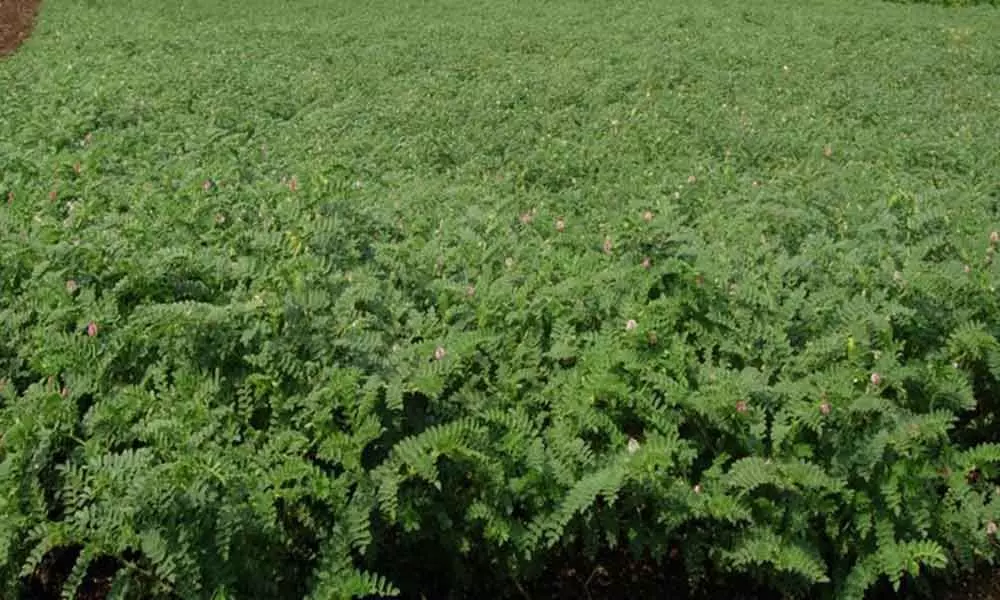Live
- Production begins at Rajhara North Coal Block in Jharkhand, to boost economy
- Gujarat Air Force Association organises annual memorial lecture on national security
- RJD MP urges Nitish Kumar to demand special package for Bihar during Delhi visit
- Indian Navy's training ships undertake professional exchanges in Cambodia
- PM Modi’s advice during ‘Pariksha Pe Charcha’ helped me overcome exam fear: 10th grader Ananya Batham
- Odisha: Key suspect in murder case surrenders in Bhubaneswar
- Gujarat: Man pressures woman for religious conversion in Vadodara
- Additional RPF deployed to facilitate Maha Kumbh devotees: Central Railway after Delhi stampede
- IPL 2025: KKR and RCB to play tournament opener at Eden Gardens on March 22
- Tejas Dhingra retains national championship title at NEC Show Jumping 2024-25
Just In
Super Chickpea all set to enter Indian farms


India is all set to launch improved chickpea, developed in record time through genomics-assisted breeding in a first-of-its-kind effort. Two new varieties with drought tolerance and disease resistance were recently identified for farming by the Indian Council of Agricultural Research (ICAR).
Hyderabad: India is all set to launch improved chickpea, developed in record time through genomics-assisted breeding in a first-of-its-kind effort. Two new varieties with drought tolerance and disease resistance were recently identified for farming by the Indian Council of Agricultural Research (ICAR).
All India Coordinated Research Project (AICRP) for Chickpea identified two desi chickpea (Bengali chana) varieties—'Pusa 10216' and 'MABC-WR-SA-1', which were developed by ICAR-Indian Agricultural Research Institute (IARI) and University of Agricultural Sciences (UAS) in Raichur, Karnataka, respectively, in collaboration with ICRISAT.
AICRP announced the decision at its recently concluded 24th Annual Group Meet.
"It is a success story of the collaboration of ICAR institutes, state agricultural university and an international organization like ICRISAT. Genomics interventions inbreeding, like molecular breeding, will significantly enhance crop productivity of legumes like chickpea," said Dr Trilochan Mohapatra, Director General, ICAR and Secretary, Department of Agricultural Research and Education (DARE), Government of India.
"We are very excited to see the outputs of the collaboration of ICAR, UAS-R, and ICRISAT in the form of improved varieties" said Dr Peter Carberry, Director General ICRISAT. He further added, "I am sure such collaborative efforts of ICRISAT with partners will benefit smallholder farmers not only in India but also in sub-Saharan Africa."
Dr NP Singh, Director of the Kanpur-based ICAR-Indian Institute of Pulses Research (IIPR), which is responsible for pulses research in India, said, "Our collaboration with ICRISAT to integrate genomics in breeding programs began several years ago. We are happy to see the first molecular breeding products in chickpea in India."
For AICRP-Chickpea, which tests new chickpea lines across the country, the two varieties are set to reaffirm the crop's role in India's growing pulses production. "Chickpea project is the first AICRP among pulses crops to identify molecular breeding products for commercial release in India," said Dr G P Dixit, AICRP-Chickpea Coordinator.
Super Annigeri-1
Similarly, MABC-WR-SA-1 was developed by inducing fusarium wilt resistance in Annigeri-1, a variety highly preferred by farmers and the industry in Karnataka. The source of resistance to the wilt, which is a major dampener of yield, was borrowed from WR315, a chickpea landrace. With 7 % increased yield potential over Annigeri-1, this new variety is also being called Super Annigeri-1. It was developed by UAS-Raichur in collaboration with ICRISAT.
Talking about the role of genomics in crop breeding, Dr Varshney, Director for ICRISAT's Genetic Gains Research Program, said both the varieties were developed in almost half the time that conventional breeding would take. "Breeding new varieties of conventionally can take 10 to 11 years. The world's growing population and the rising demand for nutritious food makes genomics key to accelerated breeding," he said. "The result of years of scientific collaboration between several national and international institutions in genomics research have started to bear fruit in farms."
Pusa chickpea
Pusa (BMG) 10216 was developed by Dr Bharadwaj Chellapilla and team at IARI in collaboration with Dr Rajeev Varshney and his team including Dr Mahendar Thudi and Dr Manish Roorkiwal at ICRISAT. Armed with extensive knowledge of the chickpea genome, thanks to groundbreaking research in 2014, Dr Varshney's team was able to introgress drought tolerance in one of India's ageing chickpea varieties, 'Pusa 372', by borrowing genes from ICC 4958, a drought-tolerant chickpea landrace. The result – Pusa 10216 showed higher yields during testing in Indian drought conditions.
"Pusa 10216, which is the first variety to have drought tolerance through molecular breeding, was developed in just four years. It showed 11.9 % increase in yield over Pusa 372 during two-year multi-location testing in drought conditions," said Dr Chellapilla.

© 2025 Hyderabad Media House Limited/The Hans India. All rights reserved. Powered by hocalwire.com






